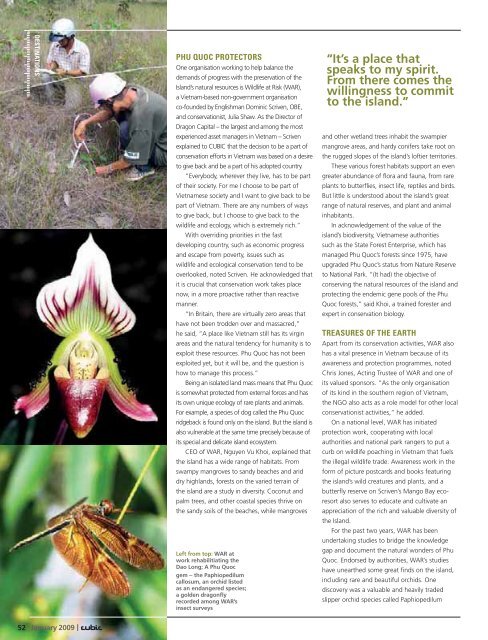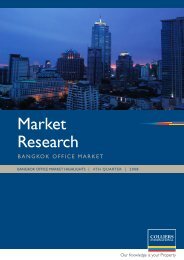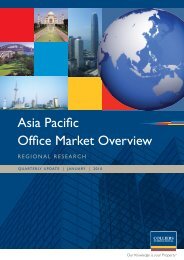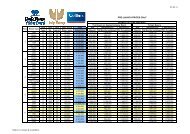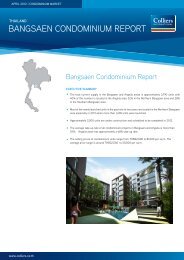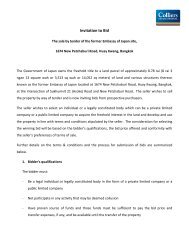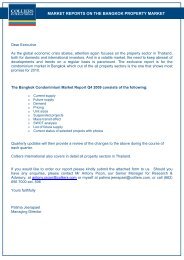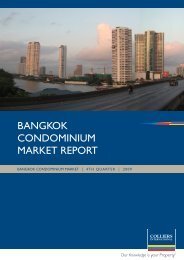CUBIC CoverDec08.indd - Colliers
CUBIC CoverDec08.indd - Colliers
CUBIC CoverDec08.indd - Colliers
You also want an ePaper? Increase the reach of your titles
YUMPU automatically turns print PDFs into web optimized ePapers that Google loves.
Destinations<br />
DESTINATIONS<br />
PHU QUOC PROTECTORS<br />
One organisation working to help balance the<br />
demands of progress with the preservation of the<br />
Island’s natural resources is Wildlife at Risk (WAR),<br />
a Vietnam-based non-government organisation<br />
co-founded by Englishman Dominic Scriven, OBE,<br />
and conservationist, Julia Shaw. As the Director of<br />
Dragon Capital – the largest and among the most<br />
experienced asset managers in Vietnam – Scriven<br />
explained to <strong>CUBIC</strong> that the decision to be a part of<br />
conservation efforts in Vietnam was based on a desire<br />
to give back and be a part of his adopted country.<br />
“Everybody, wherever they live, has to be part<br />
of their society. For me I choose to be part of<br />
Vietnamese society and I want to give back to be<br />
part of Vietnam. There are any numbers of ways<br />
to give back, but I choose to give back to the<br />
wildlife and ecology, which is extremely rich.”<br />
With overriding priorities in the fast<br />
developing country, such as economic progress<br />
and escape from poverty, issues such as<br />
wildlife and ecological conservation tend to be<br />
overlooked, noted Scriven. He acknowledged that<br />
it is crucial that conservation work takes place<br />
now, in a more proactive rather than reactive<br />
manner.<br />
“In Britain, there are virtually zero areas that<br />
have not been trodden over and massacred,”<br />
he said, “A place like Vietnam still has its virgin<br />
areas and the natural tendency for humanity is to<br />
exploit these resources. Phu Quoc has not been<br />
exploited yet, but it will be, and the question is<br />
how to manage this process.”<br />
Being an isolated land mass means that Phu Quoc<br />
is somewhat protected from external forces and has<br />
its own unique ecology of rare plants and animals.<br />
For example, a species of dog called the Phu Quoc<br />
ridgeback is found only on the island. But the island is<br />
also vulnerable at the same time precisely because of<br />
its special and delicate island ecosystem.<br />
CEO of WAR, Nguyen Vu Khoi, explained that<br />
the island has a wide range of habitats. From<br />
swampy mangroves to sandy beaches and arid<br />
dry highlands, forests on the varied terrain of<br />
the island are a study in diversity. Coconut and<br />
palm trees, and other coastal species thrive on<br />
the sandy soils of the beaches, while mangroves<br />
Left from top: WAR at<br />
work rehabilitiating the<br />
Dao Long; A Phu Quoc<br />
gem – the Paphiopedilum<br />
callosum, an orchid listed<br />
as an endangered species;<br />
a golden dragonfly<br />
recorded among WAR’s<br />
insect surveys<br />
“It’s a place that<br />
speaks to my spirit.<br />
From there comes the<br />
willingness to commit<br />
to the island.”<br />
and other wetland trees inhabit the swampier<br />
mangrove areas, and hardy conifers take root on<br />
the rugged slopes of the island’s loftier territories.<br />
These various forest habitats support an even<br />
greater abundance of flora and fauna, from rare<br />
plants to butterflies, insect life, reptiles and birds.<br />
But little is understood about the island’s great<br />
range of natural reserves, and plant and animal<br />
inhabitants.<br />
In acknowledgement of the value of the<br />
island’s biodiversity, Vietnamese authorities<br />
such as the State Forest Enterprise, which has<br />
managed Phu Quoc’s forests since 1975, have<br />
upgraded Phu Quoc’s status from Nature Reserve<br />
to National Park. “(It had) the objective of<br />
conserving the natural resources of the island and<br />
protecting the endemic gene pools of the Phu<br />
Quoc forests,” said Khoi, a trained forester and<br />
expert in conservation biology.<br />
TREASURES OF THE EARTH<br />
Apart from its conservation activities, WAR also<br />
has a vital presence in Vietnam because of its<br />
awareness and protection programmes, noted<br />
Chris Jones, Acting Trustee of WAR and one of<br />
its valued sponsors. “As the only organisation<br />
of its kind in the southern region of Vietnam,<br />
the NGO also acts as a role model for other local<br />
conservationist activities,” he added.<br />
On a national level, WAR has initiated<br />
protection work, cooperating with local<br />
authorities and national park rangers to put a<br />
curb on wildlife poaching in Vietnam that fuels<br />
the illegal wildlife trade. Awareness work in the<br />
form of picture postcards and books featuring<br />
the island’s wild creatures and plants, and a<br />
butterfly reserve on Scriven’s Mango Bay ecoresort<br />
also serves to educate and cultivate an<br />
appreciation of the rich and valuable diversity of<br />
the Island.<br />
For the past two years, WAR has been<br />
undertaking studies to bridge the knowledge<br />
gap and document the natural wonders of Phu<br />
Quoc. Endorsed by authorities, WAR’s studies<br />
have unearthed some great finds on the island,<br />
including rare and beautiful orchids. One<br />
discovery was a valuable and heavily traded<br />
slipper orchid species called Paphiopedilum<br />
22 52 November January 2009 2008 | |


